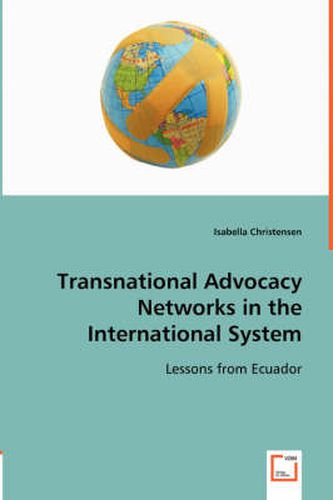Readings Newsletter
Become a Readings Member to make your shopping experience even easier.
Sign in or sign up for free!
You’re not far away from qualifying for FREE standard shipping within Australia
You’ve qualified for FREE standard shipping within Australia
The cart is loading…






This title is printed to order. This book may have been self-published. If so, we cannot guarantee the quality of the content. In the main most books will have gone through the editing process however some may not. We therefore suggest that you be aware of this before ordering this book. If in doubt check either the author or publisher’s details as we are unable to accept any returns unless they are faulty. Please contact us if you have any questions.
The transnational advocacy campaign against the construction of a second oil-transporting pipeline, the Oleoducto de Crudo Pesado, in Ecuador had no discernible impact on the decision of that state to endorse the pipeline project and only a weak influence on the crafting of related social and environmental policies. This outcome is at odds with the theoretical formulation advanced by Keck and Sikkink which holds that certain transnational advocacy campaigns can act as agents of state-level policy change. While Keck and Sikkink locate causal variables of campaign outcome on the levels of the campaign and the state, the Oleoducto de Crudo Pesado case signals the need to further incorporate international-level analysis and to investigate the impli-cations of this third dimension for transnational advocacy campaign outcome. The case study presented herein suggests that theories of transnational advocacy sacrifice predictive power by ignoring the ex-tent to which international economic and political structures can shape the preferences of states.
$9.00 standard shipping within Australia
FREE standard shipping within Australia for orders over $100.00
Express & International shipping calculated at checkout
This title is printed to order. This book may have been self-published. If so, we cannot guarantee the quality of the content. In the main most books will have gone through the editing process however some may not. We therefore suggest that you be aware of this before ordering this book. If in doubt check either the author or publisher’s details as we are unable to accept any returns unless they are faulty. Please contact us if you have any questions.
The transnational advocacy campaign against the construction of a second oil-transporting pipeline, the Oleoducto de Crudo Pesado, in Ecuador had no discernible impact on the decision of that state to endorse the pipeline project and only a weak influence on the crafting of related social and environmental policies. This outcome is at odds with the theoretical formulation advanced by Keck and Sikkink which holds that certain transnational advocacy campaigns can act as agents of state-level policy change. While Keck and Sikkink locate causal variables of campaign outcome on the levels of the campaign and the state, the Oleoducto de Crudo Pesado case signals the need to further incorporate international-level analysis and to investigate the impli-cations of this third dimension for transnational advocacy campaign outcome. The case study presented herein suggests that theories of transnational advocacy sacrifice predictive power by ignoring the ex-tent to which international economic and political structures can shape the preferences of states.